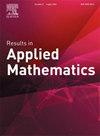用分数阶车里什科夫函数求解时空分数阶Schrödinger微分方程的一种新的数值方法
IF 1.3
Q2 MATHEMATICS, APPLIED
引用次数: 0
摘要
本文提出了一种求解时空分数阶Schrödinger方程的数值方法。该方法利用分数阶车里什科夫函数及其性质推导出与主要问题相关的余数。将Riemann-Liouville分数积分算子应用于基函数,通过车里什科夫多项式的解析表示得到精确的结果。将问题中涉及的函数的实部和虚部分离,将Schrödinger方程转化为两个方程。通过近似未知函数的分数阶导数,利用一组配点,将问题简化为一个代数方程组,其解提供了问题的数值解。此外,还进行了误差分析。最后,通过数值算例和结果验证了该方法的有效性和准确性。本文章由计算机程序翻译,如有差异,请以英文原文为准。
A new numerical approach for solving space–time fractional Schrödinger differential equations via fractional-order Chelyshkov functions
In this paper, a numerical method for solving space–time fractional Schrödinger equations is proposed. The method employs fractional-order Chelyshkov functions and their properties to derive the remainders associated with the main problem. The Riemann–Liouville fractional integral operator is applied to the basis functions, yielding exact results through the analytical representation of Chelyshkov polynomials. The real and imaginary parts of the functions involved in the problem are separated, transforming the Schrödinger equation into two equations. By approximating the fractional derivative of the unknown function and using a set of collocation points, the problem is reduced to a system of algebraic equations, the solution of which provides the numerical solution to the problem. Additionally, an error analysis is presented. Finally, numerical examples and their results demonstrate the efficiency and accuracy of the proposed scheme.
求助全文
通过发布文献求助,成功后即可免费获取论文全文。
去求助
来源期刊

Results in Applied Mathematics
Mathematics-Applied Mathematics
CiteScore
3.20
自引率
10.00%
发文量
50
审稿时长
23 days
 求助内容:
求助内容: 应助结果提醒方式:
应助结果提醒方式:


